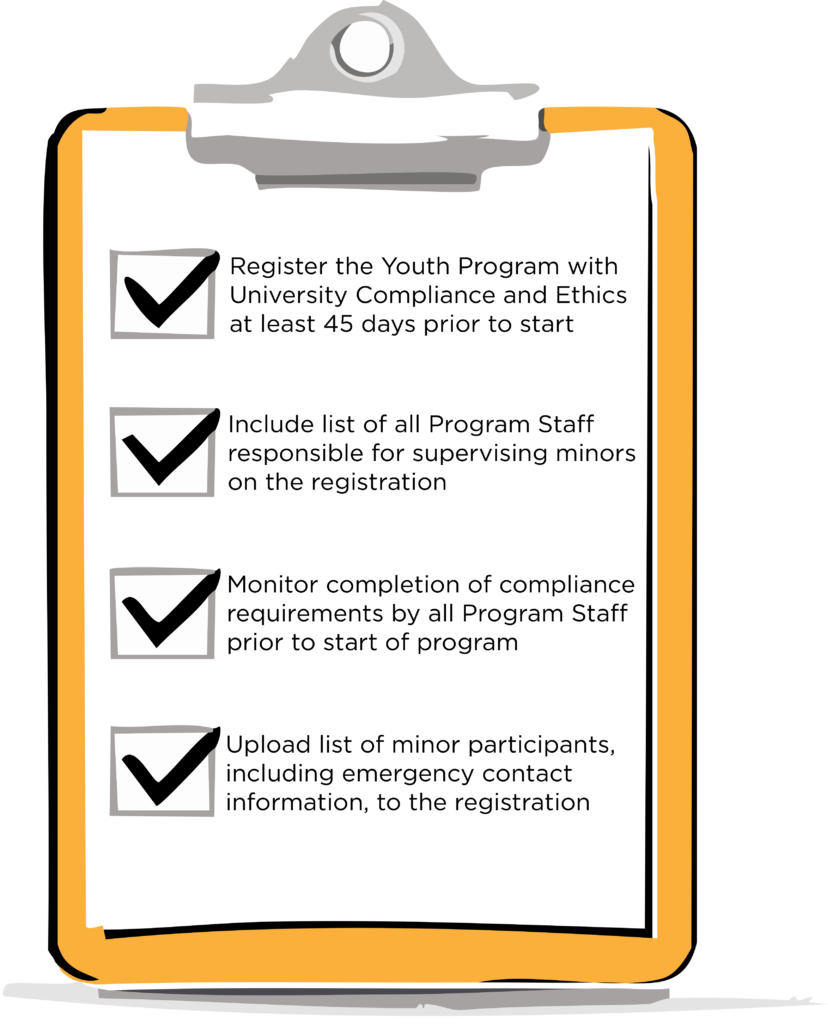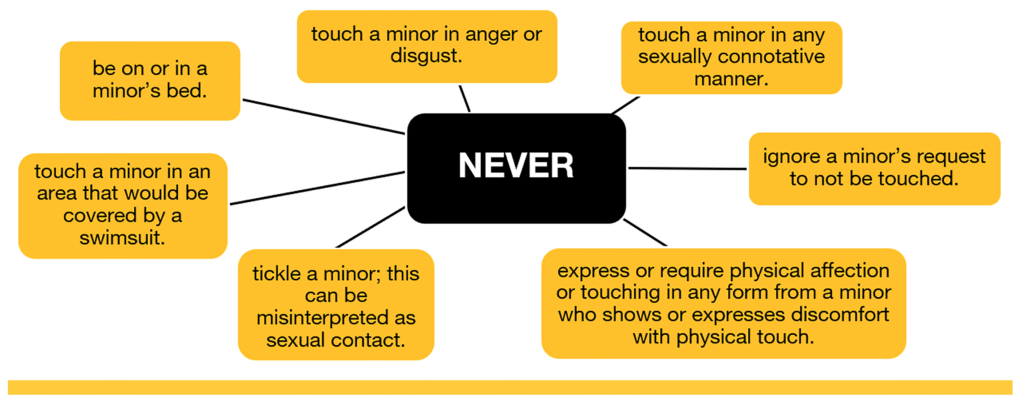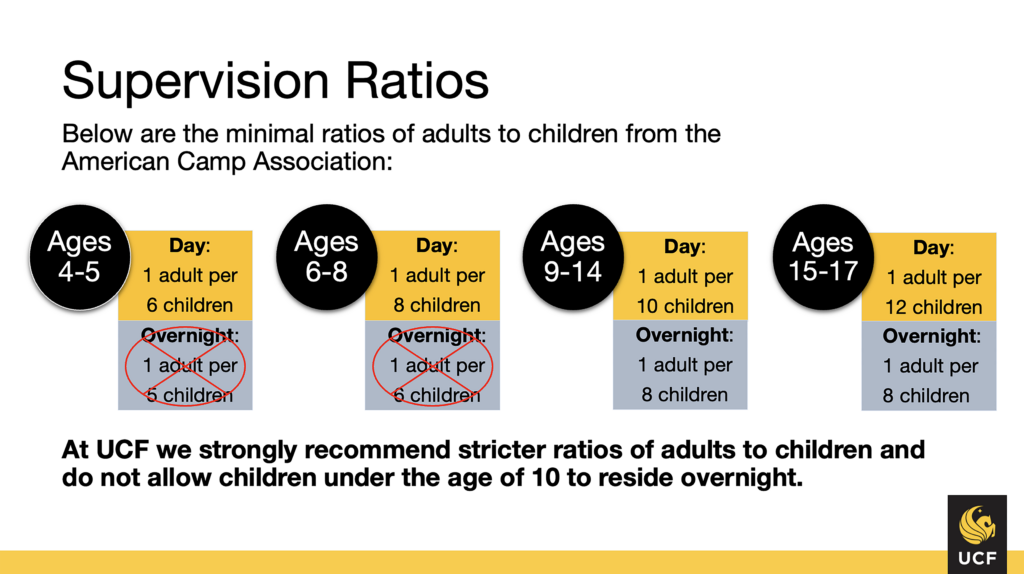IntegrityStar, April 2025 edition
As the academic year comes to a close and summer camp season begins, we want to remind the UCF community about the university’s Youth Protection Program. This program supports the variety of academic, recreational, overnight, and service programs UCF offers for non-enrolled minors. In partnership with colleges, departments, and our community, we work to ensure each youth program’s needs are met while upholding UCF’s legal responsibility to maintain a safe campus environment for the minor participants, staff, and the broader UCF community. Through this collaboration, we proudly champion the protection of our Littlest Knights.
Per UCF Policy 2-005 Youth Protection, all youth programs are required to register their session(s) with University Compliance and Ethics at least 45-days prior to the start date, including but not limited to information on the purpose of the program, a list of all program staff responsible for the supervision of the minors, a safety plan, insurance, and a list of minor participants and their emergency contact information.

As we focus on best practices, it is crucial to recognize how program staff actions and choices directly impact minor safety and well-being. Every decision, whether made or neglected, can either prevent harm or contribute to it.
University Youth Protection Program Standards for Interacting with Minors
The standards below outline UCF’s expectations for interactions between minors and program staff (i.e., those with supervisory, caregiving, chaperone, or custodial roles). These standards promote the well-being of minor participants, program staff, and are intended to protect them both from harm. They also represent minimum requirements for program staff to interact safely with minors. Individual programs, units, or departments may impose more stringent standards but may not disregard or alter these standards in any way that lessens the expectations set forth.
Program/Activity Staff Code of Conduct
This requirement must be signed electronically and applies to all staff, including volunteers, supervising minors either in UCF or third-party programs. Staff must also comply with all relevant laws, university regulations and policies, and requirements set forth by their youth program.
Expectations
- Work respectfully and cooperatively with minors, families, faculty, staff, and others as a positive role model.
- Represent the university and program with pride, using appropriate behavior, good sportsmanship, and reasonable conflict resolution skills.
- Comply with UCF Policy 2-004 Non-Discrimination Policy.
- Immediately report known or suspected abuse or neglect of minors to the Florida Department of Children and Families and the university.
- Report any injury, illness, or accident involving minors immediately to the program sponsor.
- Consistently enforce program rules, policies, and the Participant Code of Conduct, adhering to state laws and regulations.
- Provide active supervision during all times, ensuring all activities and free time are properly managed. Free time and unstructured time is not unsupervised time.
- Staff to minor ratios must be maintained at all times, including in overnight facilities if applicable.
- Ensure activities are age-appropriate and monitor interactions to prevent cliques, bullying, or exclusion.
- Anticipate and preemptively address potential behavioral issues.
- Follow the ‘Two Adult Rule’ – always have two staff present with minors and meet at visible, well-lit areas for private discussions.
- Use only program-approved communication platforms.
- Dress appropriately; avoid clothing with offensive language or clothing that promotes illegal activities.
- Discipline should be constructive and never physical, isolating, or humiliating.
- Set clear boundaries.
- Address and report harassment, bullying, or inappropriate behavior.
- Regularly account for minors with headcounts, especially during transitions.
- Physical contact should be minimal and only occur, when necessary (e.g., sports, injuries), and should always be appropriate and respectful.
Prohibited
- One-on-one contact and/or communications, via text, email, social media, or other means of electronic communication, between a staff member and a minor unless for educational or program-related purposes and permission has been obtained by the parent/guardian.
- Photographing and recording of minors, except for program/activity-related purposes where the parent or guardian has completed and signed a Photo and Media Release form or Online Participation Agreement and Waiver Form.
- Use of any device to photograph, record, and/or transmit visual images in shower areas, restrooms, or other areas where privacy is expected.
- Physical punishment.
- Allowing minors to bypass rules for the sake of popularity, especially when it comes to safety.
- Behaviors that may be misinterpreted as abuse or neglect.
- Using profanity and/or inappropriate jokes.
- Use or possession of alcohol, tobacco, illegal drugs, and/or weapons during the program or in UCF housing if applicable.
- Engaging in sexual conduct, comments, jokes, or sharing explicit material with minors.
- Hazing and bullying (verbal, physical, or cyber).
- Giving gifts to minors independent of items provided by the program/activity.
Transportation
Expectations
- All drivers of university-owned vehicles must meet Enterprise Risk and Insurance requirements set forth in UCF Policy 3-110 University Insurance.
- When transporting minors, there must always be two program staff in the vehicle to prevent one-on-one contact.
- Youth programs must verify drivers’ qualifications, including an acceptable driving record (reviewed within the last 12 months) and proper licensing.
- Drivers must be at least 18 years old and have a valid driver’s license per F.S. 322.03(1).
- Parents/guardians must provide written consent for the minor’s transportation.
- Vehicles must adhere to manufacturer seating limits, and all passengers must be seated and use seatbelts.
- Youth programs must keep a list of passengers and have a First Aid Kit onboard the vehicle.
- Establish and follow procedures for safe vehicle arrivals, departures, loading, and unloading, with proper supervision.
Prohibited
- Transportation of minors in the back of a pickup truck or trailer, except for activities like hayrides or county-approved parades with appropriate safety measures.
- Use of personal vehicles for youth program transportation.
- Traveling alone with a minor.
Housing/Overnight
Expectations
- Staff to minor ratios must be maintained at all times while the minors are in the housing facilities.
- Program staff sleeping quarters should be clearly identified to the minors.
- Ensure minors remain in their assigned bedroom at nighttime.
- Refrain from entering a minor’s personal space, including bedrooms, restrooms, or showers unless for a clear, deliberate, and appropriate purpose, and only after knocking or announcing your presence and receiving verbal authorization from the minor to enter. Invite the minors into more public areas for discussion instead of coming to them, therefore avoiding awkward situations.
If you must be present with a minor during clothing changes, make sure you have another program staff member with you, you are within audible distance of the minor, and whenever possible you only supervise minors of the same gender during these situations.
Prohibited
- Unattended or unsupervised minors during camp activities and free or unstructured time, including in UCF housing facilities. If only one staff member is able to be present, remain in a public, visible area.
- Entering a minor’s or another staff member’s personal space (e.g., restrooms, showers, bedrooms) without prior verbal consent.
- Allowing minors to enter another minor’s personal space without staff supervision.
Administering Medication
Medication must only be administered to a minor in accordance with the parent/guardian’s written instructions.
Expectations
- The minor’s parent/guardian must provide the medicine in its original pharmacy container labeled with the minor’s name, medicine name, dosage and timing of consumption.
- Over-the-counter medications must be provided in its manufacturers’ container with any special instructions regarding dosage and timing of consumption provided in writing by the parent/guardian.
- Medical staff must keep all medication in a secure location and meet with the minor at the appropriate time for distribution.
- The minor should be given the medicine to self-administer under the supervision of the medical staff or administered by medical staff if the minor is unable to self-administer.
Prohibited
- Providing or administering medication without permission from the parent/guardian.
- Allowing minors to store their own medication.
For more information on the UCF Youth Protection Program, including resources, please visit the Youth Protection Program website. Questions can be directed to University Compliance and Ethics.


